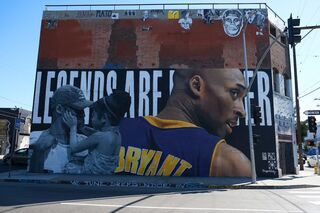Career
The Connection Between "Mamba Mentality" and Recovery
How can we work on recovery when times get tough? Inspiration from Kobe Bryant.
Posted September 8, 2022 Reviewed by Michelle Quirk
Key points
- Life doesn’t change around our recovery; we change our responses to life.
- When you have times in your recovery that you want to give up, don’t! Keep going!
- Stigma continues to be a significant reason people abstain from therapy or leave therapy early.
I must admit, I did not like Kobe Bryant at first. Yes, mostly this was because I was jealous—I am a Philadelphia 76ers fan, and I kept seeing Kobe and the Lakers win NBA championships. I was on Team Iverson, and the Sixers were fun to watch, even when we were not winning championships. The one thing about Kobe as a player was that he was a ferocious competitor, and rumors of his amazing work ethic were evident with his championship results and Hall of Fame playing career.

I became a Kobe fan after he retired. I was captivated by his speaking engagements, motivational dialogue, and the way he approached difficult challenges. I applied many of the words of wisdom he stated directly to my recovery. When his book Mamba Mentality was published in 2018, I found numerous life and recovery lessons in it. It also helped that Kobe was a die-hard Eagles fan, as I bleed green also. (If you have not seen the video of Kobe celebrating the Philadelphia Eagles winning the Super Bowl with his daughter in his arms, please take a break from reading this column and check it out.) In addition, I am a father of two girls and connected with him when Kobe stated he loved being a “GirlDad” as the father of four daughters.
In Kobe's book The Mamba Mentality: How I Play, you will find amazing photography by Andrew D. Bernstein, stories and messages from former players and coaches, and words of wisdom about how Kobe approached the game of basketball, difficulties, obstacles, and barriers. I found a huge connection between the way Kobe approached basketball and his life and the benefits of using those approaches in one’s own recovery. So many beautiful quotes and messages can be explored while one is engaging in mental health and addiction recovery.
One of the qualities that has made Kobe so successful, and always will, is his attention to detail. He always used to tell us: if you want to be a better player, you have to prepare, prepare, and prepare some more.
—From Pau Gasol, Kobe’s teammate, in Mamba Mentality (p. 15)
Pau Gasol was able to observe Kobe lead not just by his words but also by his example. It was contagious to his teammates. How best can we work our recovery when times get tough? By preparing, preparing, and preparing some more! There will be times when we do not want to go to a meeting, go to a therapy appointment, utilize our coping strategies, and put into action our relapse prevention plan, but preparing for these times will give us a better chance of staying sober and clean. Life doesn’t change around our recovery; we change our responses to life!
The only way I was able to pick up details on the court, to be aware of the minutiae on the hardwood, was by training my mind to do that off the court and focusing on every detail in my daily life. By reading, by paying attention in class and in practice, by working, I strengthened my focus. By doing all of that, I strengthened my ability to be present and not have a wandering mind.
—Kobe Bryant, Mamba Mentality (p. 29)
This quote speaks to me about being active with one’s recovery. We are training our minds and strengthening our focus by attending therapy, going to support groups, reading literature to help us stay clean and sober, and finding role models in recovery. Also, we are learning about what has contributed to our addiction, what patterns led to relapse or struggles with treatment, and what types of strategies can help us not have a “wandering mind” in our recovery. What strategies can we utilize in our relapse prevention plans to help us stay focused on our treatment and recovery?
You have to work hard in the dark to shine in the light. Meaning: It takes a lot of work to be successful, and people will celebrate that success, will celebrate that flash and hype. Behind that hype, though, is dedication, focus, and seriousness—all of which outsiders will never see. If you stop being dedicated to the craft, the commercials and contracts will all fade away.
—Kobe Bryant, Mamba Mentality (p. 59)
What a great quote! Although we are not getting commercials and contracts as we start to see the successes of our recovery (would be nice though, right?), the work that is required in early recovery can at times feel impossible. There will be many times that you may want to give up, quit, say to yourself that recovery is not possible for me, and engage in negative self-talk about your future in recovery.
Addiction is darkness, and recovery is a means to see this light shine. When you have times in your recovery that you want to give up, don’t! Keep going! As you continue to work on your treatment, the commercials, contracts, and money might not follow, but you will start to see areas in your life improve, spiritually, mentally, physically, and emotionally. I know that some people, myself included, had a deadline for recovery to work, after three months, six months, one year, two years; when will this start to work for me? I started to take it one day at a time, put the work in when I wanted to quit many times, and things finally started to click for me.
No matter what, people are going to like you or not like you. So be authentic and let them like you or not for who you actually are.
—Kobe Bryant, Mamba Mentality (p. 78)
For some in recovery, we can be impacted by being hypersensitive, looking for the approval of others, or people pleasing. We also may have thoughts including "What will people think of me if they know I am in therapy or if I am in recovery." Stigma continues to be a significant reason people abstain from therapy or leave therapy early. This is a beautiful quote focused on wanting people to be authentic, real, and genuine.
During my struggles with addiction and early on in recovery, I did not want people to know the real me, I did not want people to know that I was in recovery for drugs and alcohol, and I was afraid of being judged and ridiculed. The more I was able to work on my recovery, through the darkness, I started to accept and love who I am. This does not happen overnight, but the process of recovery is beautiful, and you eventually get to a place where you are surrounded by people who love you for you, and most importantly you love who you are!
What separates great players from all-time great players is their ability to self-assess, diagnose weaknesses, and turn those flaws into strengths.
—Kobe Bryant, Mamba Mentality (p. 197)
Acceptance! When I read this quote from Kobe Bryant, I thought about how important and helpful it was for my recovery to accept that I have a problem with drugs and alcohol and move forward toward treatment and recovery. With acceptance, what treatment provides us is the opportunity to explore our struggles and areas to improve, set goals, and move toward successfully reaching our goals.
You may find yourself believing that being in recovery is a weakness, going to therapy is a weakness, and attending a 12-step meeting is weak. The truth is that being in recovery and focused on how to grow and become a better person are strengths. I have found that people who are active in their recovery, attend therapy or 12-step meetings, and put the work in on days that they do not want to be bothered or want to quit are the people who are resilient, strong, and empowered. That is what recovery offers you!
There are plenty of other amazing quotes and beautiful life lessons from Kobe Bryant. On January 26, 2020, we lost Kobe Bryant, his daughter Gianna, and eight other individuals in a helicopter crash. We hope that all the families are surrounded by love and support! Kobe Bryant was 41 years old. Thank you Kobe for helping us see how your approach to basketball and your life can connect to the world of recovery!
References
Bryant, K. (2018). The Mamba Mentality: How I Play. MCD, Farrar, Straus, and Giroux.




